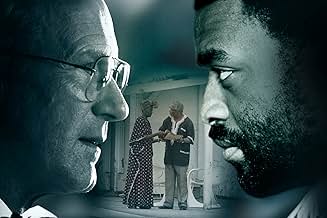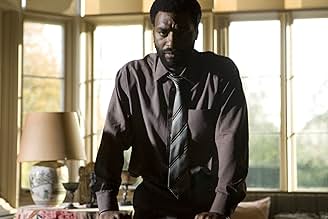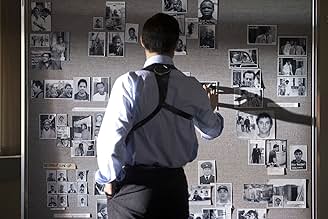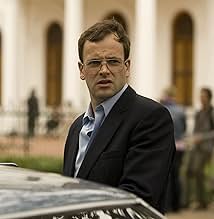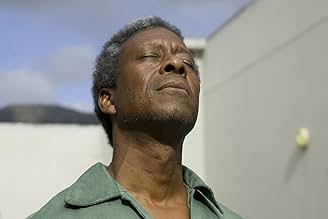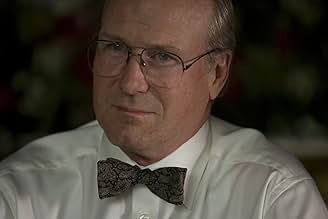AVALIAÇÃO DA IMDb
6,2/10
2,9 mil
SUA AVALIAÇÃO
Uma história baseada nas discussões secretas que derrubaram o regime do Apartheid na África do Sul.Uma história baseada nas discussões secretas que derrubaram o regime do Apartheid na África do Sul.Uma história baseada nas discussões secretas que derrubaram o regime do Apartheid na África do Sul.
- Direção
- Roteiristas
- Artistas
- Indicado para 1 Primetime Emmy
- 16 indicações no total
- Direção
- Roteiristas
- Elenco e equipe completos
- Produção, bilheteria e muito mais no IMDbPro
Avaliações em destaque
I enjoyed this. It was interesting to see how a PPE graduate can use h's knowledge of politics as well as philosophy to approach a peace settlement negotiation. However, what the film missed out was the crucial role of such an undertaking. It failed to highlight precisely and factually what really happened in the mind of the regime before reaching the settlement and how concretely these meetings were related to that decision,
I wish there had been more dialogue and explanations from Micheal Young's side and how he was brought to conjur up such meetings. The writing was not as dramatic as the circumstances allowed them to be . However,there were good actors, but Jonny Lee Miller played his role perfectly in that he portrayed Micheal Young in a dedicated and yet a humble player in the meetings. It was right for him to have a low profile in amongst the others, but it would have given the film more punch had he been given more dialogue in putting forward the importance of such meetings with a terrorist group. After all, the film was as much about Micheal Young's initiative as it was about the end of Apartheid. A good film on the whole.
I wish there had been more dialogue and explanations from Micheal Young's side and how he was brought to conjur up such meetings. The writing was not as dramatic as the circumstances allowed them to be . However,there were good actors, but Jonny Lee Miller played his role perfectly in that he portrayed Micheal Young in a dedicated and yet a humble player in the meetings. It was right for him to have a low profile in amongst the others, but it would have given the film more punch had he been given more dialogue in putting forward the importance of such meetings with a terrorist group. After all, the film was as much about Micheal Young's initiative as it was about the end of Apartheid. A good film on the whole.
The end of the hated Apartheid regime in South Africa is an uplifting story, but also, as told in this drama-documentary, an oddly undramatic one. There was no revolution, nor even a commitment to reform from within. Instead, as the system became increasingly untenable on the ground in the face of growing popular unrest, a series of unofficial negotiations between prominent Afrakaaners and the opposition were eventually endorsed by F.W. de Klerk shortly after his appointment as leader of the country, in a tacit acknowledgement that he had run out of other options. Undramatic maybe, but this is still a worthy retelling of the mechanics of the process. It's surprising to see Thabo Mbeki, later much criticised as a later south African leader when he denied that H.I.V. causes A.I.D.S., portrayed here in such a positive light. William Hurt is completely convincing as an Afrikaaner, while 'Wire' veteran Clarke Peters captures the essence of Nelson Mandela with a delicate performance . There's an element of hagiography in the film's treatment of the men who negotiated, but it is justifiably an uplifting story, especially in the knowledge of how, in the main, Mandela has managed to justify his status as virtual deity since his release; and how, for all its continuing problems, South African society has not collapsed with democracy.
It's 1985 South Africa. Public affairs director of Consolidated Goldfields Michael Young (Jonny Lee Miller) sneaks into a township looking for people to secretly negotiate with. Eighteen months later in London, he makes contact with ANC Head of Information Thabo Mbeki (Chiwetel Ejiofor). He is stalked by government agents as he tries to convince Professor Willie Esterhuyse (William Hurt) to join in the effort. Head of intelligence Dr. Neil Barnard (Mark Strong) meets Nelson Mandela (Clarke Peters) in prison. Company head Rudolph Agnew (Derek Jacobi) finances the secret meetings but will deny any knowledge of Michael's plans if discovered. In 1988 Somerset, England, the group gathers to negotiate in a palatial estate.
This is a drama of an important moment in history. The first half hour has great tension as Michael scrambles to organize this negotiation. The suspense is mostly lost once the group gathers at that mansion. The outcome is never in doubt. The actors are strong and they keep it watchable.
This is a drama of an important moment in history. The first half hour has great tension as Michael scrambles to organize this negotiation. The suspense is mostly lost once the group gathers at that mansion. The outcome is never in doubt. The actors are strong and they keep it watchable.
The Apartheid system in South Africa was one of the most brutal, unpleasant regimes to inflect Africa and the world. It lead the discrimination and holding back of the vase majority of South Africa for the privilege of the White minority. It isolated South Africa as a nation and forced one of the world's greatest leaders in prison for 27 years.
In 1985 violence in South Africa is including, the townships are rioting and the South African security forces use force to stop them. In this background is Michael Young (Jonny Lee Miller), a senior employee of Consolidated Gold, a London based mining company. He sees that Apartiheid is a failing, dying system, and he wants to see its end. He goes on a mission, backed by his Chief Executive to bring the African National Congress, and the National Party (i.e. the white Boar party) together for secret talks in London. After struggling to find a moderate third party Young is able to recruit Will Esterhuyse (William Hurt), a philosophy professor who believes in the ideas of social justice. The ANC use Thabo Mbeki (Chiwetel Ejiofor), the then information director, as their chief negotiator. He is warned by the ANC Oliver Tambo (John Kani) that he must not tell anyone about the talks because there were forces within the South African security services and extremists with the ANC who want the talks to fail. Within the National camp the President of South Africa P.W. Botha (Timothy West) tries to use the talks to keep his own presidency going. He uses his intelligence services chief Dr Barnard (Mark Strong) to use the talks to find out how the ANC function and try and split the ANC in two. Barnard tries to woo Nelson Mandela (Clarke Peters), trying to make him more important again and therefore split the leadership and the followers.
This was a well-crafted thriller, with a good script focusing on action in both England and South Africa. It clearly shows who the main players are makes Mbeki, Tambo, Mandela and Esterhuyse into well rounded characters. Esterhuyse was a particularly interesting character. There are some very talented actors in Endgame. Chiwetel Ejiofor is a very talented actor, I could watch him in anything and again he is in good form. William Hurt was a surprising casting choice, but he pulls of his role and the South African accent well. He is the most conflicted character in Endgame. Jonny Lee Miller offers a decent performance as slightly wet Michael Young who is trying to improve the lives of South Africans. Mark Strong, another talented actor was decent, but was pretty much playing the smart role as he did in Body of Lies. I also thought Timothy West was pretty good as Nelson Mandela.
The problem with Endgame is the direction by Pete Travis. The type of camera used and the way it was shot made it look like someone was using small portable camera. The camera was shaking about for all the scenes, being very distracting and needless. I was thinking use a tripod for God sake. This was a film that should have been filmed in a conventional way, like many political thrillers or like an episode of the West Wing. The only moment of real directional flair showing the scene when a ANC car is bombed. As well the film is so focused on the talks like a laser that there is no look at the wider context. Of course most the audience should know about the events of Apartiheid, but there could have shown the affects of sanctions, the system on the people, the violence, the international situation and most importantly the political negotiations with the camps. The South African government was particularly ignored. Events in the film just happened with any explanation at all which is distracting.
However this is a worthy watch about an important topic.
In 1985 violence in South Africa is including, the townships are rioting and the South African security forces use force to stop them. In this background is Michael Young (Jonny Lee Miller), a senior employee of Consolidated Gold, a London based mining company. He sees that Apartiheid is a failing, dying system, and he wants to see its end. He goes on a mission, backed by his Chief Executive to bring the African National Congress, and the National Party (i.e. the white Boar party) together for secret talks in London. After struggling to find a moderate third party Young is able to recruit Will Esterhuyse (William Hurt), a philosophy professor who believes in the ideas of social justice. The ANC use Thabo Mbeki (Chiwetel Ejiofor), the then information director, as their chief negotiator. He is warned by the ANC Oliver Tambo (John Kani) that he must not tell anyone about the talks because there were forces within the South African security services and extremists with the ANC who want the talks to fail. Within the National camp the President of South Africa P.W. Botha (Timothy West) tries to use the talks to keep his own presidency going. He uses his intelligence services chief Dr Barnard (Mark Strong) to use the talks to find out how the ANC function and try and split the ANC in two. Barnard tries to woo Nelson Mandela (Clarke Peters), trying to make him more important again and therefore split the leadership and the followers.
This was a well-crafted thriller, with a good script focusing on action in both England and South Africa. It clearly shows who the main players are makes Mbeki, Tambo, Mandela and Esterhuyse into well rounded characters. Esterhuyse was a particularly interesting character. There are some very talented actors in Endgame. Chiwetel Ejiofor is a very talented actor, I could watch him in anything and again he is in good form. William Hurt was a surprising casting choice, but he pulls of his role and the South African accent well. He is the most conflicted character in Endgame. Jonny Lee Miller offers a decent performance as slightly wet Michael Young who is trying to improve the lives of South Africans. Mark Strong, another talented actor was decent, but was pretty much playing the smart role as he did in Body of Lies. I also thought Timothy West was pretty good as Nelson Mandela.
The problem with Endgame is the direction by Pete Travis. The type of camera used and the way it was shot made it look like someone was using small portable camera. The camera was shaking about for all the scenes, being very distracting and needless. I was thinking use a tripod for God sake. This was a film that should have been filmed in a conventional way, like many political thrillers or like an episode of the West Wing. The only moment of real directional flair showing the scene when a ANC car is bombed. As well the film is so focused on the talks like a laser that there is no look at the wider context. Of course most the audience should know about the events of Apartiheid, but there could have shown the affects of sanctions, the system on the people, the violence, the international situation and most importantly the political negotiations with the camps. The South African government was particularly ignored. Events in the film just happened with any explanation at all which is distracting.
However this is a worthy watch about an important topic.
ENDGAME, as written by Paula Milne and directed by Pete Travis, is a thinking person's film. The subject is the ongoing crises of the Apartheid in South Africa (here during the years 1985 - 1990, with after film commentary to 1999) and the extended secret meetings between the Apartheid regime as controlled by President Botha (Timothy West), those meetings held between the African National Congress represented by Thabo Mbeki (Chiwetel Ejiofor) with prisoner Nelson Mandela (Clarke Peters) as the heart of the blacks and the increasingly disillusioned Afrikaner Apartheidists lead by Professor Will Esterhuyse (William Hurt) convened by a British representative Michael Young (Jonny Lee Miller) acting as spokesman for his entrepreneurial boss Rudolf Agnew (Derek Jacobi) of a major British industry vested in South Africa. The talks are wired by Botha's intelligence officer Dr. Niel Barnard (Mark Strong) and level of intrigue is high. The message of the film is the struggle and final victory of democracy and the end of Apartheid in South Africa, and while the cerebral discussions by this fine group of actors is illuminating, the film gains its power from fast shots of the conditions in South Africa at the time, including rioting, terrorist acts, loss of families, and the ever present intrigue and danger surrounding those men attending the secret meetings.
The supporting cast (especially John Kani as Oliver Tambo, the venerated life long friend of Mandela) is exceptionally strong, but in the end it is the unexpected fine acting of William Hurt and the always excellent Chiwetel Ejifor who remind us how small scaled dramas can have far more impact than the big epics we are used to enduring. This film is especially excellent for informing the public about the ins and outs and meanings of the South African Apartheid and why the ending of that evil regime lighted the fuse for so many other important sociologic changes.
Grady Harp
The supporting cast (especially John Kani as Oliver Tambo, the venerated life long friend of Mandela) is exceptionally strong, but in the end it is the unexpected fine acting of William Hurt and the always excellent Chiwetel Ejifor who remind us how small scaled dramas can have far more impact than the big epics we are used to enduring. This film is especially excellent for informing the public about the ins and outs and meanings of the South African Apartheid and why the ending of that evil regime lighted the fuse for so many other important sociologic changes.
Grady Harp
Você sabia?
- Erros de gravaçãoAt the beginning of the movie it clearly shows that the speedometer is at 0 while driving down the road.
- Citações
Epilogue: When the IRA decided to negotiate a peaceful solution to the Irish conflict, they secretly turned to the ANC
[African National Congress]
Epilogue: for advise on how to do it. They are now advising Hamas on the same strategy.
- ConexõesFeatured in The 62nd Primetime Emmy Awards (2010)
- Trilhas sonorasLow Life
Performed by Scanners
Written by Sarah Daly and Matthew Mole
Courtesy of Influx Music Ltd./Dam Mak Records/Rhino Independent
By Arrangement with Warner Music Group Film & TV Licensing
Principais escolhas
Faça login para avaliar e ver a lista de recomendações personalizadas
- How long is Endgame?Fornecido pela Alexa
Detalhes
- Data de lançamento
- Países de origem
- Idiomas
- Também conhecido como
- Frente a Frente Com o Inimigo
- Locações de filme
- Empresas de produção
- Consulte mais créditos da empresa na IMDbPro
Bilheteria
- Faturamento bruto nos EUA e Canadá
- US$ 9.645
- Fim de semana de estreia nos EUA e Canadá
- US$ 1.608
- 8 de nov. de 2009
- Faturamento bruto mundial
- US$ 26.260
- Tempo de duração1 hora 49 minutos
- Cor
- Mixagem de som
- Proporção
- 2.35 : 1
Contribua para esta página
Sugerir uma alteração ou adicionar conteúdo ausente



